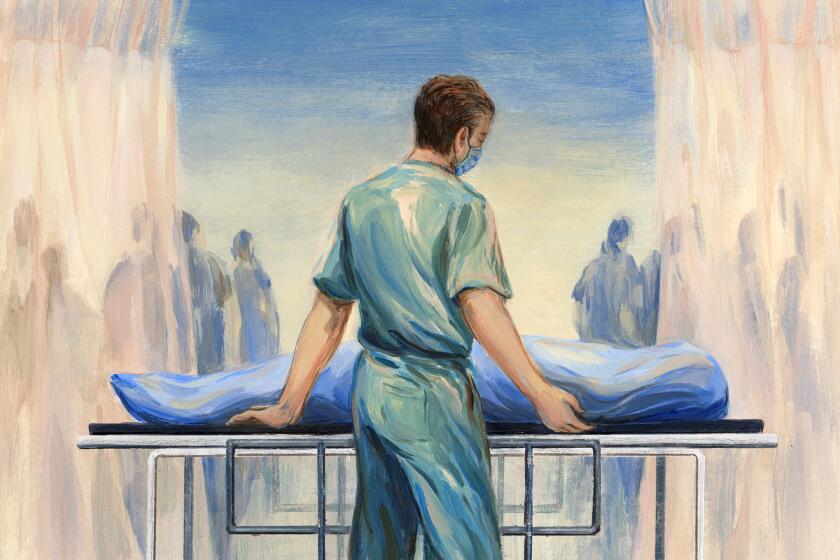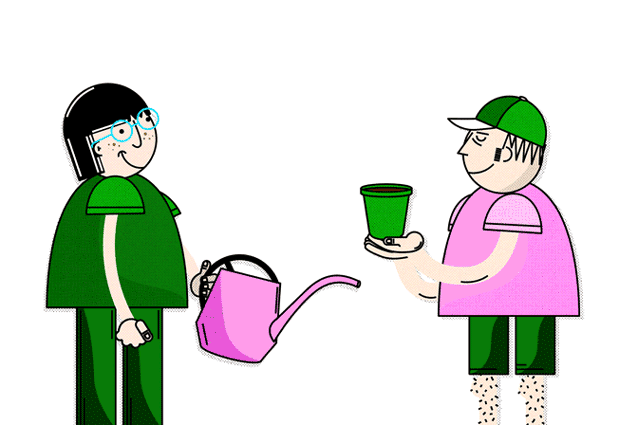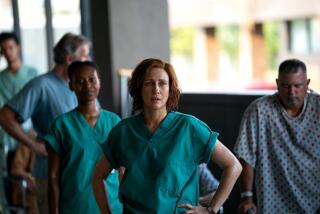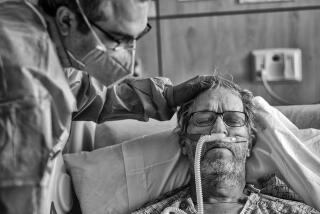‘I will never forget Karl, the friend, the protector, the dignified and compassionate escort of the dead’
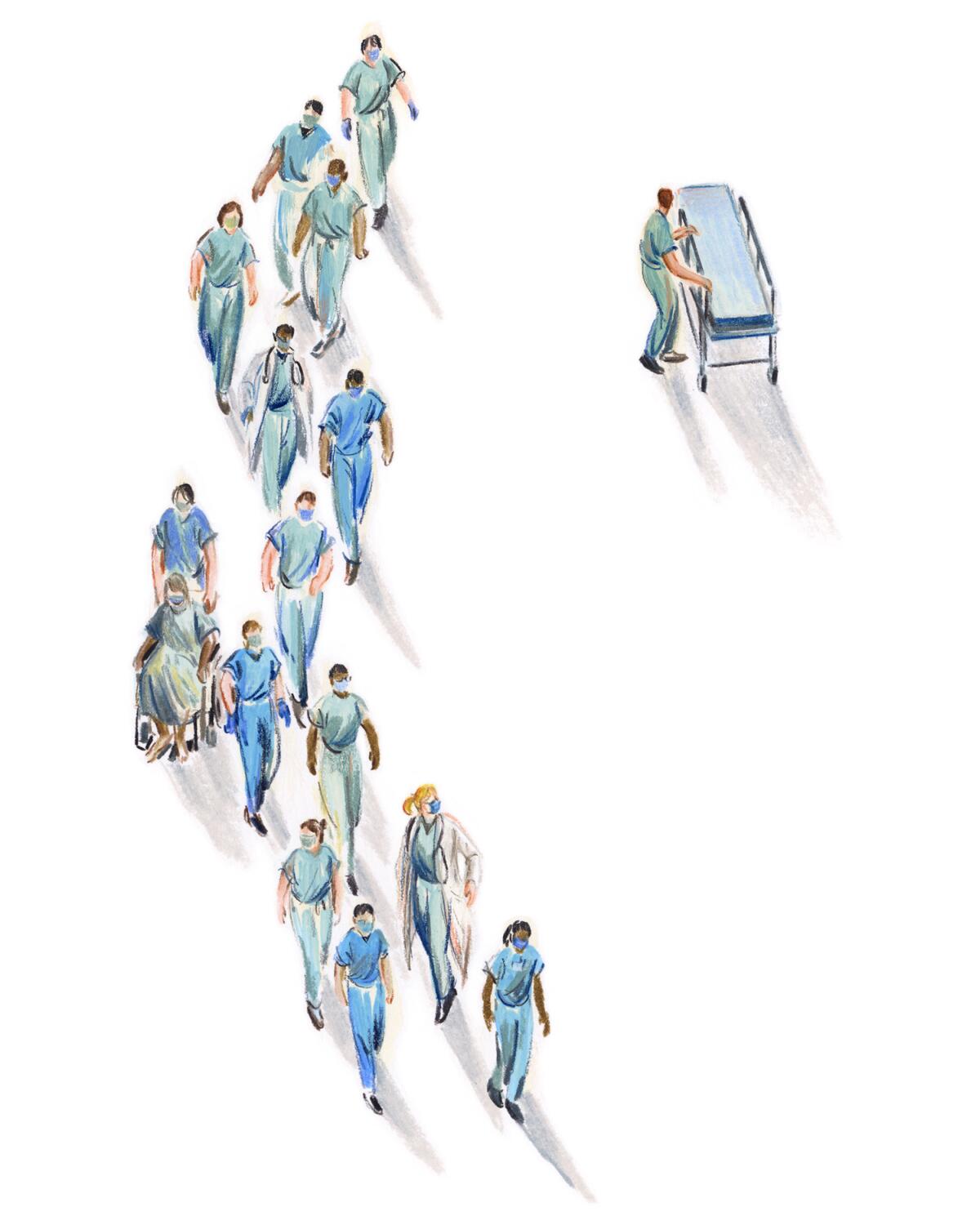
Dr. Courtney Martin is medical director for maternity services at Loma Linda University Children’s Hospital. Under normal circumstances, she spends most of her time in labor and delivery, caring for pregnant women, performing gynecologic surgery, bringing babies into the world. But at the peak of the pandemic, she began splitting her time between maternity COVID patients and the medical center’s overflow COVID-19 ward, which was housed in what used to be the intensive care unit for heart patients. She wrote this essay during a bout of insomnia in February.
I want to write about Karl.
This is a long essay, but it’s because I love to write. Perhaps it’s my therapy, and perhaps it’s because Karl deserves to be noticed. Every hospital has a Karl.
Karl is someone I would have never met or noticed if not for the pandemic — not because I wouldn’t have wanted to, but my path doesn’t frequently cross with that of the dispatch employees. (I have learned this is my loss because they are wonderful people and perhaps have some of the best stories and see the hospital and patients from a unique perspective.) However, from the first spike of the pandemic in July and August, and then, most frequently in December and January, I watched Karl.
Karl was the guy who used to take patients from their room to radiology, run tubes of blood to the lab and do important dispatch things — even chat patients up if they were able to converse — riding the elevator all day, doing important work for patients and keeping the flow going. But due to the pandemic, Karl became the person who moved the dead from the rooms and then took them to the morgue. Karl became the body collector.
I was seeing him regularly in the converted cardiac unit which meant it was a bad time during the pandemic. (If an OBGYN is routinely in the ICU and caring for male patients — we are in dark days.) Like many other physicians, I was asked to help and the answer was obvious. I came ready to learn. We also had a fair number of OB patients who were critically ill and thus, I was up on the unit many days during the week and was comfortable taking care of critically ill COVID patients.
Whenever I saw Karl, he had a lightness to him, always with a smile. He had soft eyes with small wrinkles and crow’s feet and an unassuming approach. And he had a way of seamlessly sliding on and off the unit with his morgue transport operation — while everyone else was hustling around the unit. The phones were ringing, pagers were going off, doors were opening and closing, IV pumps were beeping, ventilators were oscillating, and then there was Karl, with a respectful smile, just quietly and efficiently moving the deceased onto a metal gurney, and then covering them with a black tarp.
The man collecting the Loma Linda hospital’s COVID victims was all but invisible
I suppose, at first, it was hard to see Karl and his colleagues visit the units so frequently, but as the pandemic marched on, I gather that for self-preservation, the nurses and respiratory therapists and other staff members just stopped overtly noticing. When I happened to ask the nurses about Karl, they would say, “Oh, he is so kind. He just comes and collects the bodies, and then before we know it, another person has been wheeled in. We don’t really have time to think about it, but we are grateful for him.” They did say that Karl seemed to always be the one who came, at least to their unit.
There was one day four people died around the same time in this ICU unit. This was happening during rounds, and multiple teams were congregating in the hall. Karl came in his distinctive teal green scrubs and his soft smile, but he accidentally got pinned, with his metal gurney, between the wall and the team of physicians and nurses. He patiently and respectfully waited, performed a miraculous maneuver and somehow, without being noticed, slid the cold metal bed into the room to collect the body. I watched this intently and realized not one person said hello to him, or looked up, or even made an attempt to move to help him get by.
It was eerie and gave me a sense of loneliness for Karl and the others who transport the dead. Did they really not see him, or was it that it was too painful to keep saying hi, acknowledging that we didn’t save yet another father, mother, grandpa, grandma, or friend?
In a few hours, I’m pretty sure Karl collected all the dead and took them each to the morgue, which at this point was in refrigerated semi-trucks. I can’t imagine how he transferred them from the gurney, or how he placed them in the truck. That day was filled with a lot of grief felt by the unit staff, the nurses, the residents, the doctors — but what about dispatch? What about Karl?
I happened to run into Karl in labor and delivery a few weeks after the surge had abated. He was doing pre-pandemic dispatch things and taking a patient to get an ultrasound. I had talked to Karl one time before in the ICU because I was interested in what he did, but on this day, because nothing was urgent and he had a moment, I asked him a few questions. He was back to his old job and seemed the same as he did when I met him wheeling the metal gurney.
I asked Karl how he was doing, about what it was like to be the one to transport the dead, and I thanked him for doing that terribly difficult job.
It had been a struggle to think about Karl and the others who transported the dead, up and down, all day and night, and what it must have been like when we had to start using refrigerated morgue trucks, and what it was like to keep coming back to work. How did he wake up and come in, knowing he would move the dead all day long? What was it like when we thanked doctors, nurses, respiratory therapists, staff, the cleaning crew? Did we ever thank the dispatch workers?
I asked him how his mental health was, what he liked about his job. Was it better now that the pandemic was declining?
Karl floored me: He said he kept going during all of it because he felt like when all the dust settled, the monitors were turned off, the family had left, and the sheet was pulled over the body, that someone needed to make sure they still got care. Someone needed to make sure they were put on the metal gurney nicely, arms positioned comfortably, feet and legs covered. Someone needed to take them down to the morgue with dignity. Someone needed to escort them, go with them. Someone needed to be their guardian.
He said that it mattered because if it was his family, he would want that for them. He felt important, and implied that this was his mission in this war on COVID.
I almost lost it.
This kind man. This healthcare hero. When the storm was insane — when it was overflowing — he made sure our patients had care and dignity. How noble. How incredible. How moving.
As an OBGYN, I know how special and sacred birth is — but, sadly, I also know that so, too, is death. It is just as important to have reverence for the life leaving this world as the one entering.
When I look back at the pandemic, there will certainly be things I remember, but I will never forget the dispatch employees — the unsung heroes of the pandemic. I will never forget Karl, the friend, the protector, the dignified and compassionate escort of the dead.
More to Read
Sign up for Essential California
The most important California stories and recommendations in your inbox every morning.
You may occasionally receive promotional content from the Los Angeles Times.
